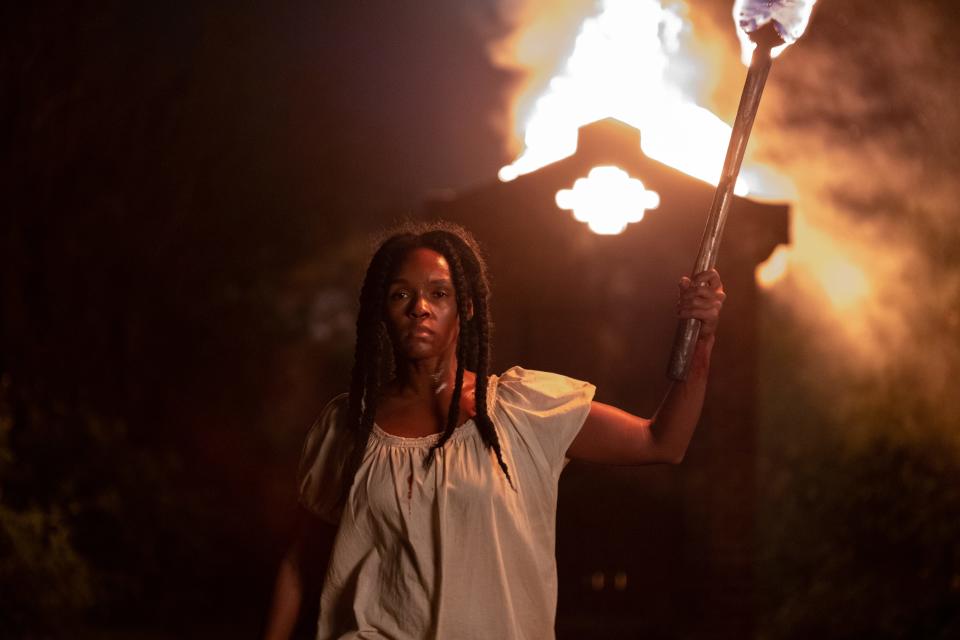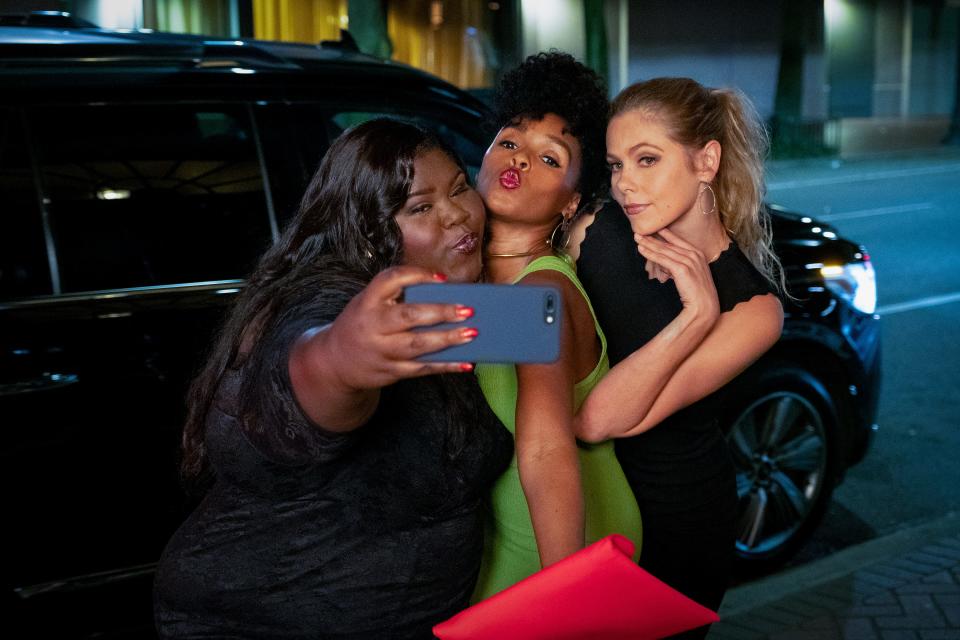'White men owe Black women peace': Janelle Monae on why 'Antebellum' is relevant
"Antebellum" may be billed as a fictional horror film, but its themes don't stray far from reality.
Writer/directors Gerard Bush and Christopher Renz's psychological thriller (available on streaming and video-on-demand platforms) upends the typical slave-movie narrative and holds a mirror up to America, forcing viewers to acknowledge that racism isn't dead. Perfectly timed to the current national and global discourse on racial justice, "Antebellum" uses a horrific period in U.S. history to illustrate that even though slavery is technically over, racism and racist ideations continue to hide in plain sight.
"The past is not the past. We are experiencing that today," says Janelle Monáe, who plays dual roles as Veronica Henley, a sociologist and author, and Eden, an enslaved woman.
On the Civil War-era plantation in "Antebellum," the enslaved people are instructed to be silent unless directly addressed by plantation leaders.
Monáe relates this to how Black women fight to be heard and are seen as threatening for doing basically anything: talking too much, rebelling against the patriarchy, or fighting against white supremacy.
"If we even celebrate ourselves, if we say 'Black Lives Matter,' that is a threat to some white people," Monáe says. "We're still dealing with racist policies. We're still dealing with folks who would rather see us silent, who would rather see us not out there protesting, who would rather see us performing, playing basketball, singing. They don't want to see us start a revolution and take back our freedom."
Review: Janelle Monae's 'Antebellum' tackles the horrors of slavery – with a rousing twist
Fall streaming preview: 10 must-see new movies to see while stuck at home, from 'Mulan' to 'Rebecca'

Throughout "Antebellum," the outward cruelty of the plantation owners is juxtaposed against a modern-day backdrop of microaggressions directed toward Veronica. The eras are hundreds of years apart, but neither of Monáe's characters can escape racism.
Though Veronica isn't necessarily instructed to be silent and forced to work in dreadful conditions without pay, she still encounters annoying at best and traumatizing at worst forms of racism.
"It also highlights what it is like for a Black woman to carry the burden of systemic racism and white supremacy on our backs and try to dismantle it every single day," Monáe says. "This film speaks about the silence and the violence against Black women."
Jack Huston, who plays plantation overseer Captain Jasper and describes his character as the "embodiment of evil," says "Antebellum" serves as a reminder that we're still dealing with the ramifications of the Civil War era.
"The film opens with a wonderful line of William Faulkner's, where he says, 'The past is not dead, it's not even past,'' ' says Huston, citing the election of President Donald Trump as reverting race relations "back to the start."
"Four hundred years of slavery and persecution and racism, and every time we think we've come further along, we've taken 10 steps forward (and then) we realize we've taken 20 steps back."
The English actor, also seen in "The Irishman," quotes a compelling line in the movie – "We are nowhere, we are everywhere" – to illustrate the idea that haters were always around, they just laid "dormant."
"We had no idea just how bad and divisionist the world and the country is until the new regime came in, and it was just appalling," Huston says.
'You can't be halfway woke': Singer Lady A calls out country group Lady A for performative allyship

Though Huston and Jena Malone (as Elizabeth) take on the villain roles, Malone says people need to know that these characters aren't exactly far-fetched. In playing Jasper's wife, Malone says, it was important for her to not "other" her character as existing in this "extreme group," but to understand that Elizabeth could be an extension of her.
"We were both indoctrinated with white supremic delusion," Malone says. "It's not like building a character that exists over there. It felt like there was some kind of need of catharsis for my own 'white history' to be able to embody this role of the oppressor accurately, with compassion but with not an erasive history."
Huston shares the same sentiments and hopes people watching realize that although "Antebellum" is a triggering and disturbing film, it's not a far-fetched concept.
"It's not such a horror movie that we're thinking, 'Oh, my God, that would never happen.' What makes it that much more horrific is that we're playing on the world today and the world that we see," Huston says.
After what seems like months on the plantation, enduring torment and countless dehumanizing moments, Eden plans her escape to freedom. Throughout the film, other enslaved men and women look to Eden as their leader, the one to save them all from their suffering, which Monáe says is similar to what happens in modern-day society when people turn to Black women for help.
"We have to talk about, again, the amount of responsibility we put on Black women to clean up and save this country," Monáe says. "It's unfair. It's not cool. It's not OK. I think that America and people, especially men, especially white men, owe Black women peace, and that's what I hope happens."
This article originally appeared on USA TODAY: 'Antebellum' star Janelle Monae says 'white men owe Black women peace'


